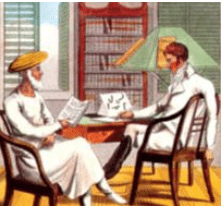Test: Civilising the “Native”, Educating the Nation - 1 - Class 8 MCQ
15 Questions MCQ Test - Test: Civilising the “Native”, Educating the Nation - 1
How many pathshalas were there in Bengal and Bihar according to William Adam's report?
Identify this linguist who arrived in Calcutta in 1783 as a junior judge at the Supreme Court.

| 1 Crore+ students have signed up on EduRev. Have you? Download the App |
Where in India a Madrasa was set up in 1781 to promote the study of Arabic, Persian and Islamic Law ?
What was Rabindranath Tagore's main idea behind starting Santiniketan school?
What did Mahatma Gandhi believe about English education?
What did Thomas Babington Macaulay suggest should be the focus of education in India?
From the outline map of India, identify the place marked A in black circle. Situated on the banks of Ganges, in Uttar Pradesh also known as Varanasi or Kasi where the Hindu College was established in 1791.
Who started the journal Asiatick Researches?
From the image given below, name this English scholar who learnt Sanskrit and ancient sacred writings of Hinduism along with William Jones.
William Jones was an expert in ____.
Three Englishmen were busy discovering the ancient Indian heritage and mastering Indian languages. One was Willam Jones and another Henry Thomas Colebrooke. Name the third person
What does the Arabic word Madrasa refer to?
Name the important scholar who studied Sanskrit and found it to be the most scientific language of the world. He also translated the important works Shakuntala and Manusmriti into English
Rabindranath Tagore established Santiniketan as an abode of _____.
What did William Adam find out about the education system in Bengal and Bihar in the 1830s?

















